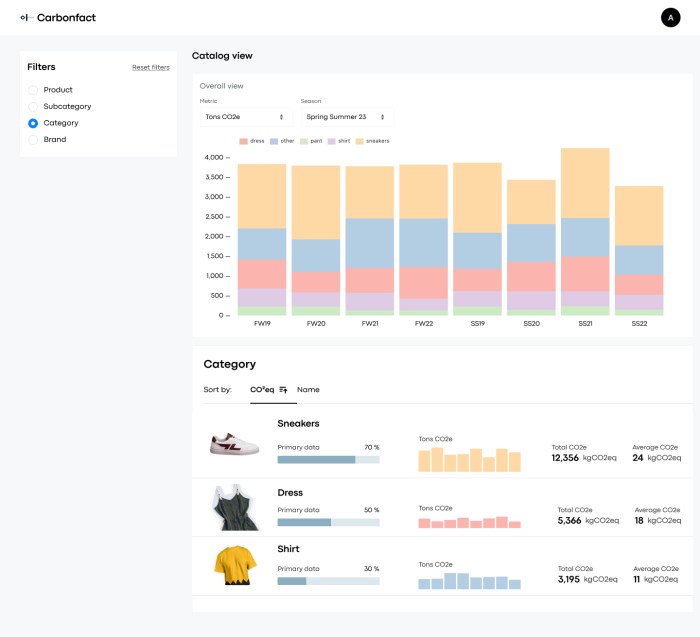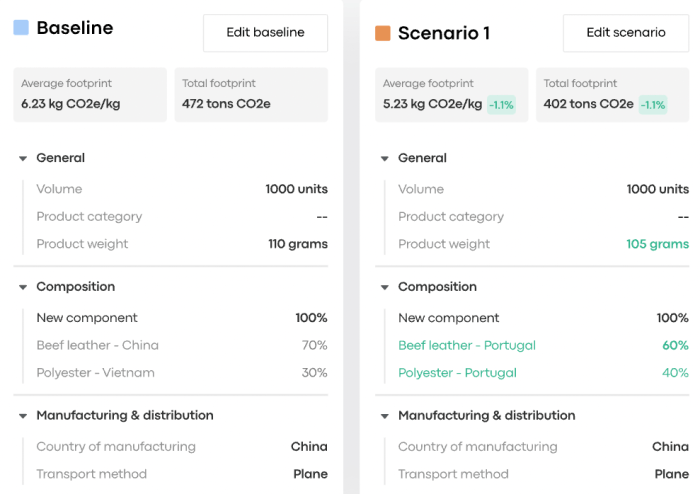Carbonfact is a carbon management platform designed specifically for the fashion industry. It’s a game-changer in a world where sustainability is no longer a trend but a necessity. The fashion industry, known for its complex supply chains and significant environmental impact, has long struggled with effective carbon management. Carbonfact steps in to address this challenge head-on, providing fashion brands with the tools and resources they need to measure, track, and reduce their carbon footprint.
By offering a comprehensive suite of functionalities, Carbonfact empowers fashion businesses to gain complete visibility into their emissions across their entire supply chain. This includes raw material sourcing, manufacturing, transportation, and even end-of-life management. With this detailed data at their fingertips, brands can identify key areas for improvement, set ambitious emission reduction targets, and implement strategic initiatives to achieve them.
Carbonfact
The fashion industry is a significant contributor to global carbon emissions. From raw material sourcing to manufacturing, transportation, and retail, every stage of the fashion supply chain generates a substantial carbon footprint. Carbonfact, a cutting-edge carbon management platform, is specifically designed to address the unique challenges faced by the fashion industry in reducing its environmental impact.
Carbon Emissions in the Fashion Industry
The fashion industry’s carbon footprint is vast and multifaceted. Several key areas contribute significantly to its environmental impact:
- Raw Material Production: The production of raw materials like cotton, polyester, and leather requires significant energy and water resources, leading to greenhouse gas emissions.
- Manufacturing: Textile manufacturing processes, including spinning, weaving, dyeing, and finishing, consume vast amounts of energy and water, contributing to carbon emissions.
- Transportation: The global nature of the fashion industry necessitates extensive transportation of goods from manufacturing sites to retailers and consumers, generating significant carbon emissions from shipping and air freight.
- Retail and Consumption: The fast fashion industry encourages frequent purchases and disposals, leading to increased carbon emissions from production, transportation, and waste management.
Carbonfact’s Core Functionalities
Carbonfact provides a comprehensive suite of tools and functionalities to help fashion brands effectively manage their carbon footprint:
- Carbon Footprint Calculation: Carbonfact uses a robust methodology to calculate the carbon footprint of a brand’s entire supply chain, from raw material sourcing to end-of-life disposal.
- Data Collection and Analysis: The platform integrates with existing supply chain data systems to gather comprehensive data on material usage, energy consumption, transportation, and waste generation. This data is then analyzed to identify key areas for carbon reduction.
- Carbon Reduction Strategies: Carbonfact provides insights and recommendations for reducing carbon emissions through sustainable material sourcing, energy efficiency improvements, optimized transportation logistics, and waste management initiatives.
- Reporting and Transparency: Carbonfact generates detailed carbon footprint reports that can be shared with stakeholders, demonstrating a brand’s commitment to sustainability and providing transparency on its environmental impact.
- Collaboration and Communication: The platform facilitates collaboration among brands, suppliers, and other stakeholders, fostering a shared understanding of carbon reduction goals and best practices.
Carbonfact’s Approach to Carbon Management
Carbonfact distinguishes itself from other carbon management solutions in the fashion industry through its:
- Industry-Specific Focus: Carbonfact is specifically designed to address the unique challenges and complexities of the fashion industry, providing tailored tools and insights.
- Data-Driven Approach: The platform relies on robust data analysis and insights to guide carbon reduction efforts, ensuring that interventions are targeted and effective.
- Collaborative Ecosystem: Carbonfact fosters collaboration among stakeholders throughout the supply chain, enabling a collective approach to sustainability.
- Transparency and Reporting: The platform provides comprehensive reporting capabilities, allowing brands to demonstrate their commitment to sustainability and track their progress over time.
Key Features of Carbonfact
Carbonfact is a game-changer for the fashion industry, offering a comprehensive suite of tools and resources to help brands and manufacturers achieve their sustainability goals. It goes beyond simply measuring carbon footprints, providing a platform for proactive carbon management and driving real change.
Data Collection and Analysis Capabilities, Carbonfact is a carbon management platform designed specifically for the fashion industry
Carbonfact utilizes advanced data collection and analysis capabilities to provide a clear and accurate picture of a fashion company’s carbon footprint. This includes:
- Comprehensive Data Collection: Carbonfact integrates with existing business systems and data sources, capturing data from various stages of the fashion supply chain, including raw material sourcing, manufacturing, transportation, distribution, and retail. This ensures a complete and holistic view of the carbon footprint.
- Advanced Data Analysis: Carbonfact employs sophisticated algorithms and machine learning techniques to analyze the collected data and identify key areas of carbon emissions. It breaks down emissions by product, process, and location, providing actionable insights to inform decision-making.
- Real-time Tracking: Carbonfact offers real-time tracking of carbon emissions, allowing companies to monitor progress, identify potential hotspots, and adjust strategies as needed. This dynamic approach enables continuous improvement and a proactive approach to carbon management.
Tools and Resources for Setting Emission Reduction Targets and Implementing Sustainable Practices
Carbonfact equips fashion businesses with the tools and resources they need to set ambitious emission reduction targets and implement sustainable practices across their operations:
- Target Setting: Carbonfact provides a framework for setting science-based targets aligned with global climate goals. This ensures that companies are setting realistic and achievable targets that contribute to a sustainable future.
- Sustainability Roadmap: Carbonfact helps develop customized sustainability roadmaps that Artikel specific actions and timelines for reducing emissions. These roadmaps provide a clear path for companies to achieve their targets and demonstrate their commitment to sustainability.
- Sustainable Material Selection: Carbonfact offers access to a database of sustainable materials and suppliers, allowing companies to choose eco-friendly options for their products. This enables them to reduce their environmental impact from the outset.
- Process Optimization: Carbonfact provides tools for optimizing production processes, reducing waste, and improving efficiency. This can include streamlining workflows, adopting lean manufacturing techniques, and implementing circular economy principles.
- Renewable Energy Solutions: Carbonfact helps companies explore and implement renewable energy solutions, such as solar panels or wind turbines, to reduce their reliance on fossil fuels. This transition to clean energy sources is essential for achieving significant carbon reductions.
Collaboration and Transparency
Carbonfact fosters collaboration and transparency throughout the fashion supply chain, enabling brands, suppliers, and consumers to work together towards shared sustainability goals:
- Supplier Engagement: Carbonfact facilitates communication and collaboration between brands and suppliers, encouraging them to share data, implement sustainable practices, and work together to reduce emissions. This collaborative approach ensures that sustainability efforts are integrated across the entire supply chain.
- Consumer Transparency: Carbonfact enables brands to communicate their sustainability efforts and carbon footprint to consumers through product labeling and online platforms. This transparency builds trust and empowers consumers to make informed choices based on environmental impact.
- Industry-wide Collaboration: Carbonfact supports industry-wide initiatives and collaborations, promoting best practices and driving collective action to address climate change. This shared commitment to sustainability accelerates progress and creates a more sustainable future for the fashion industry.
Benefits for Fashion Businesses: Carbonfact Is A Carbon Management Platform Designed Specifically For The Fashion Industry
Carbonfact offers a plethora of benefits for fashion businesses, empowering them to achieve sustainability goals, enhance brand reputation, and navigate evolving regulatory landscapes. By providing a comprehensive platform for carbon footprint management, Carbonfact allows fashion brands to gain valuable insights into their environmental impact, enabling them to make informed decisions and implement effective strategies for reducing their carbon footprint.
Improved Environmental Performance
Carbonfact empowers fashion businesses to improve their environmental performance by providing a clear understanding of their carbon footprint across the entire supply chain. With detailed insights into emissions sources, businesses can prioritize areas for reduction and implement targeted strategies to minimize their impact. For example, Carbonfact can help identify high-emission materials, manufacturing processes, or transportation routes, allowing businesses to switch to more sustainable alternatives or optimize logistics.
Impact on the Fashion Industry
Carbonfact, with its focus on carbon management for the fashion industry, has the potential to significantly impact the sector’s sustainability journey. By providing a comprehensive platform for tracking, analyzing, and reducing emissions, Carbonfact empowers fashion businesses to take concrete steps towards a more sustainable future.
A More Sustainable Fashion Supply Chain
Carbonfact can contribute to a more sustainable and responsible fashion supply chain by providing a unified platform for collaboration and data sharing. This platform allows fashion businesses to:
- Track emissions across the entire supply chain: Carbonfact provides a centralized system for collecting and analyzing emissions data from all stages of production, from raw material sourcing to manufacturing, distribution, and retail. This enables businesses to identify hotspots and areas where emissions reduction efforts are most impactful.
- Collaborate with suppliers and partners: By sharing data and insights through Carbonfact, fashion businesses can work collaboratively with their suppliers to reduce emissions throughout the supply chain. This fosters transparency and accountability, leading to collective action towards sustainability.
- Develop and implement effective carbon reduction strategies: Armed with comprehensive data and insights, fashion businesses can develop and implement tailored carbon reduction strategies. This includes exploring alternative materials, optimizing production processes, and implementing energy-efficient practices.
- Demonstrate commitment to sustainability: By leveraging Carbonfact, fashion businesses can showcase their commitment to sustainability to consumers, investors, and other stakeholders. This transparency builds trust and strengthens brand reputation, ultimately contributing to a more sustainable fashion industry.
Pre-Carbonfact vs. Post-Carbonfact Landscape
The fashion industry landscape is expected to transform significantly with the adoption of Carbonfact. Here’s a comparison of the pre- and post-Carbonfact scenarios:
| Aspect | Pre-Carbonfact | Post-Carbonfact |
|---|---|---|
| Carbon Management | Limited data collection and analysis, fragmented efforts, lack of transparency | Comprehensive data tracking and analysis, centralized platform for collaboration, increased transparency and accountability |
| Sustainability Initiatives | Isolated and ad-hoc initiatives, limited impact | Data-driven and strategic initiatives, measurable results, greater impact on emissions reduction |
| Consumer Perception | Limited understanding of brand sustainability practices | Increased consumer trust and confidence in brands committed to sustainability |
| Investor Interest | Limited investment in sustainable fashion initiatives | Increased investor interest in companies demonstrating strong sustainability practices |
Carbonfact is more than just a tool; it’s a catalyst for positive change in the fashion industry. It empowers brands to take ownership of their environmental impact, embrace sustainable practices, and become leaders in the movement towards a more responsible fashion future. By enabling transparency, collaboration, and data-driven decision-making, Carbonfact is paving the way for a greener, more sustainable fashion landscape.
Carbonfact, a carbon management platform tailored for the fashion industry, is making waves in the sustainability space. As the industry faces growing pressure to reduce its environmental impact, Carbonfact provides the tools and insights needed to track, measure, and ultimately reduce emissions. This focus on sustainable fashion aligns perfectly with the investment strategy of Harlem Capital, which is raising a $150 million fund to support diverse founders in various sectors, including sustainable businesses like Carbonfact.
With this funding, Carbonfact can further its mission of empowering the fashion industry to become more environmentally responsible.
 Standi Techno News
Standi Techno News

